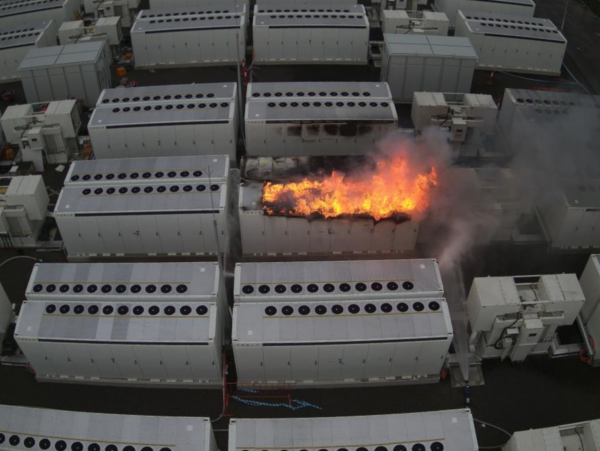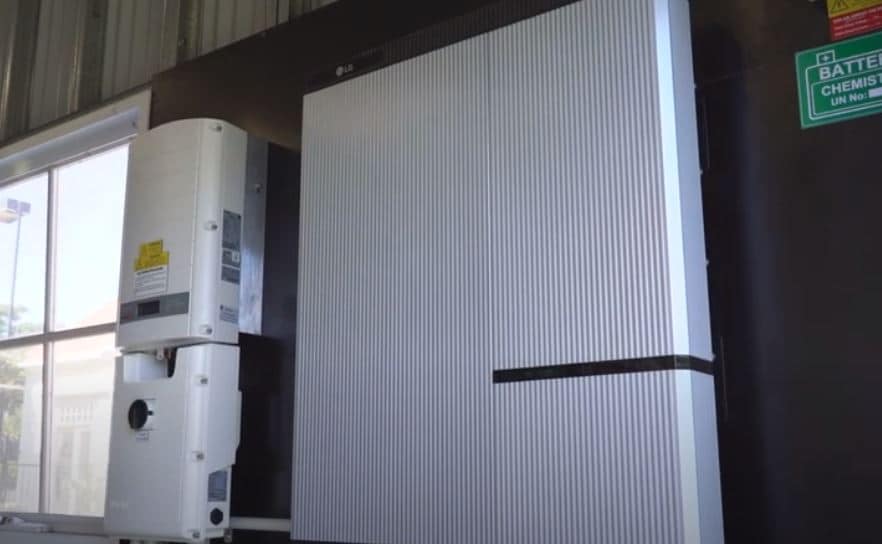National watchdog the Australian Competition and Consumer Commission (ACCC) is setting about directly contacting Australians who may have faulty solar batteries in their home, urging households to check serial numbers as the national recall has now been expanded to include new models, affected systems and dates of manufacture.
The ACCC said batteries may be branded LG, SolaX, Opal, Redback, RedEarth, Eguana, or VARTA, though a number of these brands including RedEarth and Redback clarified their work with the ACCC has previously been completed.*
So far, about 2,900 batteries have been replaced or removed from consumers’ properties, according to the ACCC. A further 1,400 batteries have been switched off or have had the maximum charge capacity reduced to 75% to minimise the risk overheating while they wait for a replacement or refund.
LG and SolaX are still trying to trace around 3,000 additional recalled batteries.

Image: Fire Rescue Victoria
LG will replace recalled batteries manufactured between 29 March 2017 and 13 September 2018 free of charge. Alternatively, consumers can opt for a refund and have the recalled battery removed from their property at no cost. Households who have higher electricity bills as a result of not being able to use their battery as expected will also be compensated by LG, the ACCC says.
“Unfortunately, since October 2019 there have been nine reported incidents involving these types of batteries in Australia resulting in property damage and one injury,” ACCC Deputy Chair Delia Rickard said.
LG has also told the ACCC it has identified about 10,000 additional batteries, manufactured from 21 January 2016 to 28 March 2017 and from 14 September 2018 to 30 June 2019, that may be at risk of overheating. To address this risk, LG will install diagnostic software to detect abnormal behaviour in battery cells pre-emptively. Faulty batteries, if identified by the software, will then be replaced for free. Electrical safety regulators are currently assessing LG’s proposed diagnostic software remedy, the ACCC said.
The revised recall comes on the same week Fire and Rescue New South Wales released a notice warning shoppers to be vigilant about batteries, as its crews had responded to over 180 lithium-ion battery fires since Jan. 1, 2022. This is compared with just over 16 in 2021, more than a 10-fold increase.
The NSW fire service did, however, note the majority of incidents were in small, portable devices like e-bikes and e-scooters.
The fire risk of lithium battery makeups has been a divisive issue in the industry, with some labelling it anti-renewable “fear mongering” while experts like UK Newcastle University Professor Paul Christensen believe the risks require serious consideration. In Australia, cognisance around lithium battery risks took on a new light when Neoen’s Victoria Big Battery caught fire during commissioning in 2021.
While these concerns have served as a leg up for non-flammable battery makeups, like flow batteries, lithium-ion remains predominant due to its commercial availability and high energy density.
*Article amended on November 25 to clarify which brands are included in the recall. Additional brands listed by the ACCC are not necessarily part of the recall. Both RedEarth and RedBack batteries stopped using LG components a number of years ago and their batteries are not part of the renewed recall campaign.
This content is protected by copyright and may not be reused. If you want to cooperate with us and would like to reuse some of our content, please contact: editors@pv-magazine.com.









2 comments
By submitting this form you agree to pv magazine using your data for the purposes of publishing your comment.
Your personal data will only be disclosed or otherwise transmitted to third parties for the purposes of spam filtering or if this is necessary for technical maintenance of the website. Any other transfer to third parties will not take place unless this is justified on the basis of applicable data protection regulations or if pv magazine is legally obliged to do so.
You may revoke this consent at any time with effect for the future, in which case your personal data will be deleted immediately. Otherwise, your data will be deleted if pv magazine has processed your request or the purpose of data storage is fulfilled.
Further information on data privacy can be found in our Data Protection Policy.